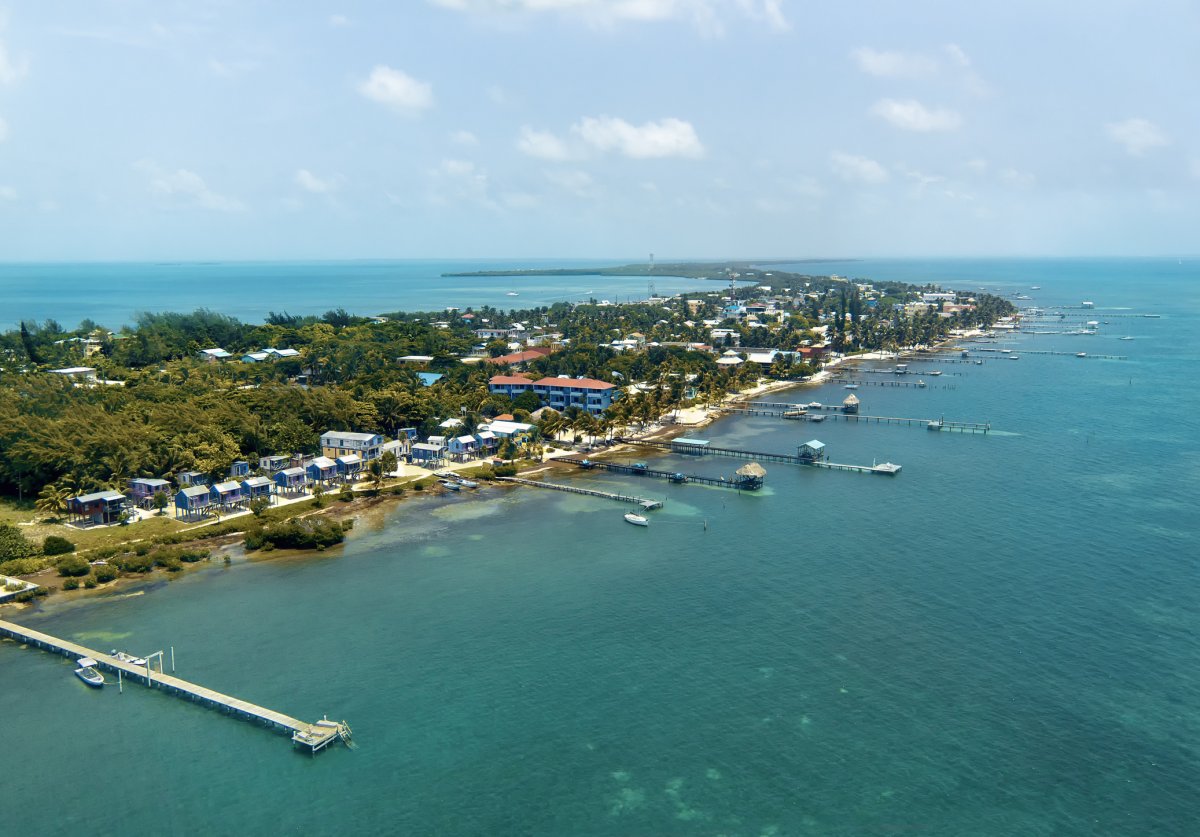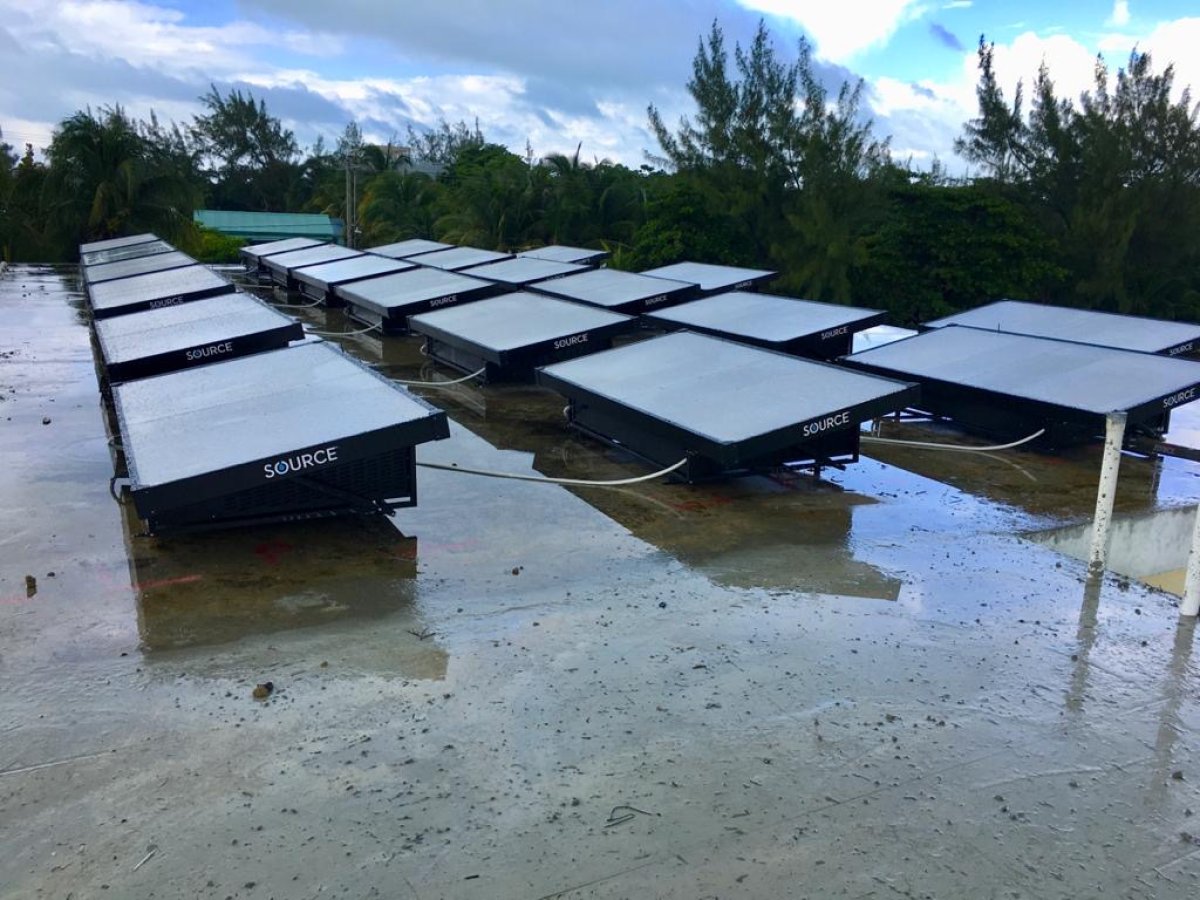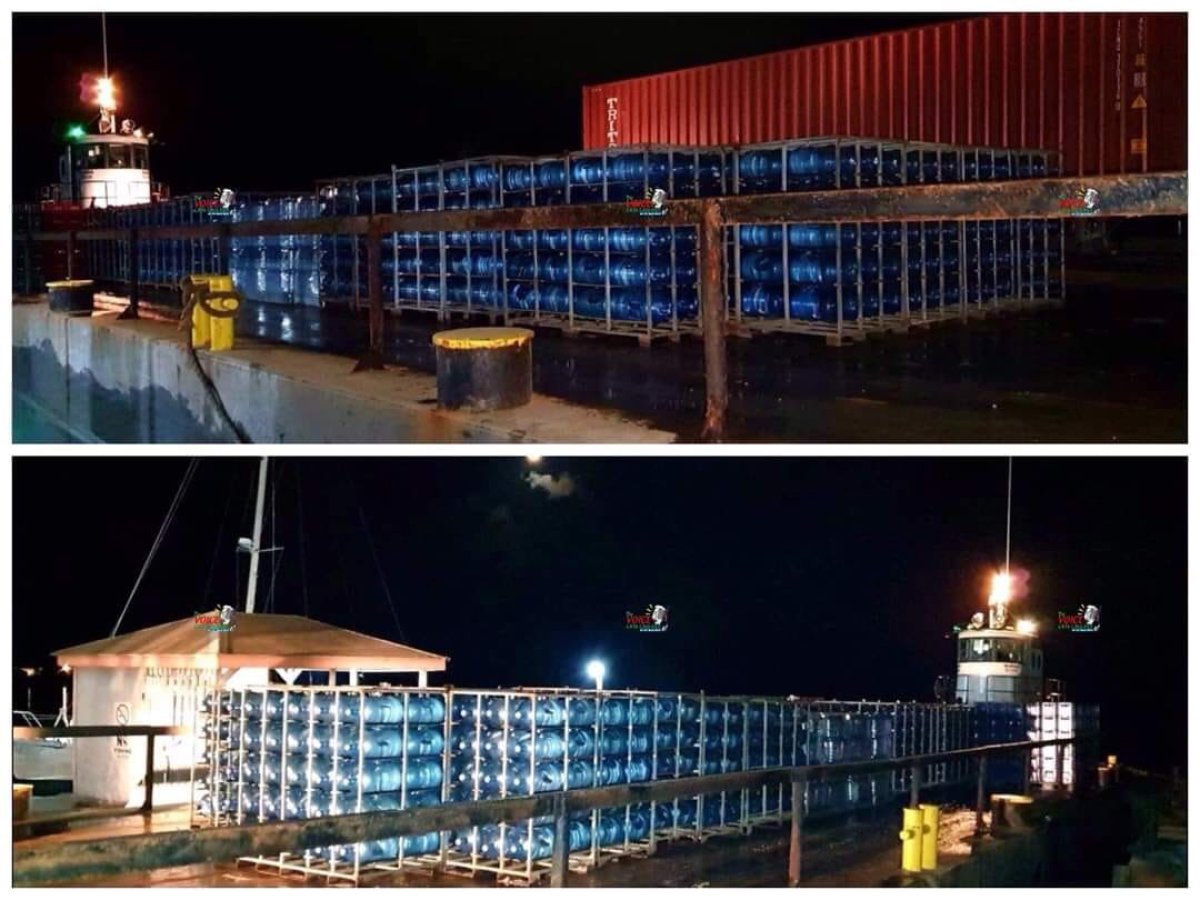On a remote island off the coast of Belize, there is a fishing village that, historically, has relied on ferries to bring its residents drinking water in plastic bottles—a service that has now been disrupted as a result of the COVID-19 pandemic.
Caye Caulker Village is on the southern side of Caye Caulker Island, about 20 miles northeast of Belize City. The island is around five miles long and less than one mile wide, with a population of approximately 2,000. It has poor access to fresh water, and storms and flooding mean it often struggles to produce drinking water required. As such, it has relied on shipments of bottled drinking water delivered on ferries.
Belize announced its first case of COVID-19 on March 23. According to the Johns Hopkins University dashboard, the country has had 18 confirmed cases with two deaths. Since the start of April, the government in Belize has closed its borders to most travelers. It also declared a state of emergency on April 1, preventing people from going outside between the hours of 8 p.m. and 5 a.m. for 30 days. As Caye Caulker relies heavily on tourism, its economy has been badly impacted. Delays in shipping have also led to problems getting the regular shipments of fresh water.

However, at the end of 2019, an initiative of the Inter-American Development Bank (IDB) with the Belize Ministry of Tourism and Civil Aviation, in collaboration with the consultancy firm Environmental Resources Management (ERM), led to the installation of Arizona-based Zero Mass Water's hydropanels that turn air and sunlight into drinking water. The installation of the panels in Caye Caulker, which was done before the COVID-19 outbreak, is part of a wider project called the Caribbean Climate Smart Island Program of the IDB, which aims to demonstrate how these communities can transition to a low-carbon, climate-resilient development pathway in sectors such as water, energy and waste treatment, among others.
Cody Friesen is CEO and co-founder of Zero Mass Water. The companycompany sells hydropanels that generate water from the air and solar power, even when humidity is as low as 10 percent. "They work by using solar thermal energy to heat the surrounding air, and using solar-powered fans to move the heated air over a hygroscopic material inside the hydropanel," Friesen told Newsweek. "This material, he said, only attracts pure water molecules. These are adsorbed by the material and move into a reservoir. The water collected is then treated to become "very pure drinking water, free of contaminants, which is sustainably taken from the troposphere instead of existing aquifers," he added.

In Caye Caulker, 23 hydropanels were installed at the Roman Catholic School and the Community Center. "Before this installation, the school and health center would purchase water directly from our provider, who would ship it to us in plastic bottles," Seleny Villanueva-Pott, chair of the Caye Caulker Village Council, told Newsweek. "In the dry season, sometimes water would run low, meaning the island could go a few days without it. Now the children at the primary school and people who visit the Health Center have a constant supply."
"The panels... have been a blessing for low-income families. They no longer have to send money with their children to purchase water at school."
In total, the hydropanels can produce up to 911 gallons of drinking water per month. Since the COVID-19 outbreak, the Caye Caulker community has opened up the installation to the rest of the community, with almost all the water produced each day being used.
Water scarcity is a problem in countries across the world. According to the UN, 1.2 billion people live in regions where water is scarce, while 1.6 billion "face economic water shortage, where countries lack the necessary infrastructure to take water from rivers and aquifers." The coronavirus pandemic has brought the problem into focus. A key message from the World Health Organization (WHO) throughout the outbreak has been the importance of handwashing—placing extra pressure on the already limited resource. Without a regular supply of clean water, the risk of infection increases.
In the future, climate change is expected to increase the number of people facing water scarcity. "With the existing climate change scenario, almost half the world's population will be living in areas of high water stress by 2030," the UN says.
Friesen said Zero Mass Water has carried out projects to install hydropanels in over 40 countries. "We're working to bring renewable water to people facing water stress as quickly as possible," he said. "Access to clean water is a human rights issue, the better access people have to clean water, the more happy, fair and productive their lives can be. The biggest concern over the coming decade is that climate change will compound the challenges we see today, with extreme weather, pollution and increased global conflict over clean water sources. Investing in clean water now means that we can do our part to help alleviate some of the future stresses we'll see and be more resilient in the future."
In Caye Caulker, the hydropanels have also helped reduce the amount of plastic waste being produced. It is estimated the panels will offset around one million single-use plastic bottles. Another one of Zero Mass Water's installations in Timor-Leste has also helped lower waste. Like Caye Caulker, the remote island off the east coast of East Timor also relied on bottled water being shipped in.

Villanueva-Pott said reducing plastic waste is important to Caye Caulker village: "We strive to be greener and more self-sufficient throughout the island, so the installation of the hydropanels will allow us to use much less plastic," she said.
Zero Mass Water's hydropanels are available to buy for personal use, with two units costing between $5,500 and $6,500. The installation at Caye Caulker Village was entirely funded by the IDB and there was no operational cost to the community.
"These panels are important for people to have in areas where water is scarce," Villanueva-Pott said. "It makes water out of the atmosphere and the technology behind it is truly amazing. With climate change, we are expected to see longer periods of the dry season, so this installation will keep our school with a constant supply of drinking water. We no longer have to worry about a water shortage or if the ferry does not come in."
Correction 04/29 2.55 a.m.: This article has been corrected to say the entire array of hydropanels produces 911 gallons of water per month.
Update: This article has been updated to include more information about companies involved in the project.
Centers for Disease Control and Prevention Advice on Using Face Coverings to Slow Spread of COVID-19
- CDC recommends wearing a cloth face covering in public where social distancing measures are difficult to maintain.
- A simple cloth face covering can help slow the spread of the virus by those infected and by those who do not exhibit symptoms.
- Cloth face coverings can be fashioned from household items. Guides are offered by the CDC.
- Cloth face coverings should be washed regularly. A washing machine will suffice.
- Practice safe removal of face coverings by not touching eyes, nose, and mouth, and wash hands immediately after removing the covering.
World Health Organization advice for avoiding spread of coronavirus disease (COVID-19)
Hygiene advice
- Clean hands frequently with soap and water, or alcohol-based hand rub.
- Wash hands after coughing or sneezing; when caring for the sick; before, during and after food preparation; before eating; after using the toilet; when hands are visibly dirty; and after handling animals or waste.
- Maintain at least 1 meter (3 feet) distance from anyone who is coughing or sneezing.
- Avoid touching your hands, nose and mouth. Do not spit in public.
- Cover your mouth and nose with a tissue or bent elbow when coughing or sneezing. Discard the tissue immediately and clean your hands.
Medical advice
- Avoid close contact with others if you have any symptoms.
- Stay at home if you feel unwell, even with mild symptoms such as headache and runny nose, to avoid potential spread of the disease to medical facilities and other people.
- If you develop serious symptoms (fever, cough, difficulty breathing) seek medical care early and contact local health authorities in advance.
- Note any recent contact with others and travel details to provide to authorities who can trace and prevent spread of the disease.
- Stay up to date on COVID-19 developments issued by health authorities and follow their guidance.
Mask and glove usage
- Healthy individuals only need to wear a mask if taking care of a sick person.
- Wear a mask if you are coughing or sneezing.
- Masks are effective when used in combination with frequent hand cleaning.
- Do not touch the mask while wearing it. Clean hands if you touch the mask.
- Learn how to properly put on, remove and dispose of masks. Clean hands after disposing of the mask.
- Do not reuse single-use masks.
- Regularly washing bare hands is more effective against catching COVID-19 than wearing rubber gloves.
- The COVID-19 virus can still be picked up on rubber gloves and transmitted by touching your face.
Uncommon Knowledge
Newsweek is committed to challenging conventional wisdom and finding connections in the search for common ground.
Newsweek is committed to challenging conventional wisdom and finding connections in the search for common ground.
About the writer
Hannah Osborne is Nesweek's Science Editor, based in London, UK. Hannah joined Newsweek in 2017 from IBTimes UK. She is ... Read more





